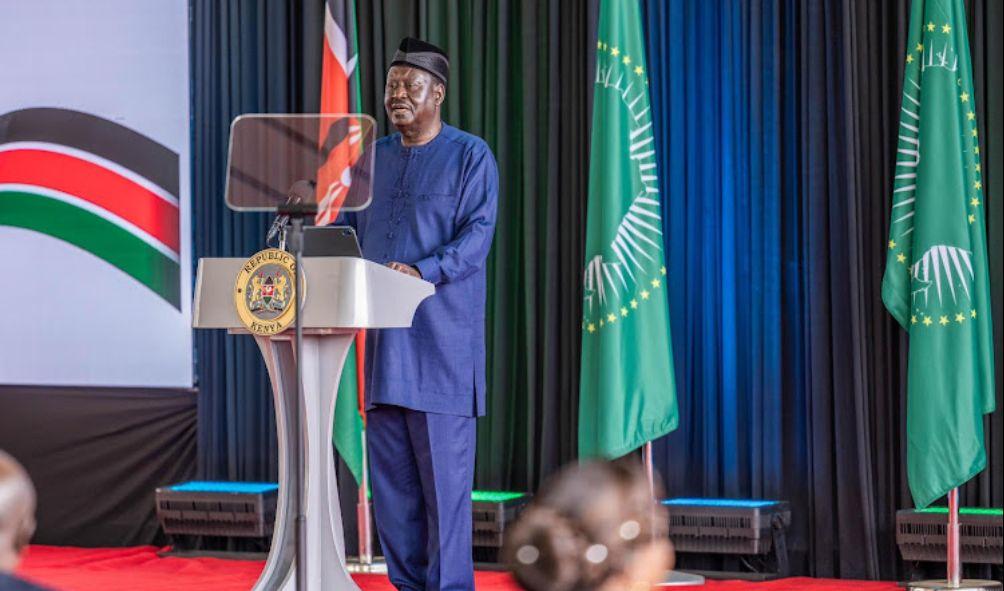Africa’s Anglophone-Francophone Divide: Key to Raila Odinga’s Success in 2025 African Union Commission Chair Election
Experts caution that the split between Anglophones and Francophones within the African Union could significantly impact the upcoming African Union Commission (AUC) chairmanship elections next year.
On Tuesday, Kenya presented former Prime Minister Raila Odinga as its nominee for the AUC chairmanship at a State House event in Nairobi, highlighting the country’s engagement with the complex dynamics between these two linguistic groups.
This launch marked the beginning of Odinga’s formal campaign for the February 2025 elections, which will determine the successor to the current chair, Mr. Moussa Faki Mahamat.
The event was attended by EAC chairman and South Sudan President Salva Kiir Mayardit, Tanzanian President Samia Suluhu Hassan, and Uganda’s Yoweri Museveni, signaling strong support from the East African Community (EAC).
Also present were Rwanda’s State Minister for Foreign Affairs James Kabarebe and Burundian Prime Minister Gervais Ndirakobuca.
Despite the official campaign kickoff, experts express concern that Odinga’s candidacy may be influenced by AU politics, which often reflects the continent’s East-West and former colonial affiliations, with Francophones sometimes perceived as aligned with France.
Of the AU’s 54 member countries, 24 are Anglophone and 28 Francophone, with Portuguese and Arabic also recognized.
The division between Anglophones and Francophones occasionally impacts AU deliberations, though it is rarely acknowledged openly.
Dr. Kizito Sabala, a lecturer at the University of Nairobi’s Department of Diplomacy and International Studies, believes that the Anglophone-Francophone divide will affect Odinga’s candidacy.
He notes that historically, the AU’s primary division has been between Anglophone and Francophone countries.
If Anglophones support Odinga and Francophones back a French-speaking candidate, it could split the vote continent-wide.
Dr. Sabala adds that Raila’s advantage might be that there isn’t a strong Francophone candidate at the moment.
ALSO READ:
- “Two Groups, One Agenda”: Gachagua Accuses Raila of Secret Political Deals
- Exclusive: Ida Odinga’s 75th Birthday Party in Karen (Photos)
- FKF President Discloses Exact Amount Paid to Harambee Stars Players
- Gachagua’s Ally Senator John Methu Admits Ruto Might Win 2027 Elections
- Maraga Explains Why He Hasn’t Campaigned in Kisii Despite 2027 Bid
The February 2025 elections will see Kenya’s former prime minister contest against Djibouti’s Foreign Affairs Minister Mahamoud Ali Youssou, representing a predominantly French- and Arabic-speaking nation.
Other contenders include former Mauritius Foreign Minister Anil Kumarsingh Gayan and Richard James Randriamandrato, a former foreign minister of Madagascar.
However, aside from the Anglophone-Francophone divide, other factors such as regional considerations and the current political climate will also play a significant role.
Former AUC Deputy Chairperson Erastus Mwencha, a Kenyan, emphasizes that experience, job knowledge, and the political context are crucial in determining the AUC chair.
He argues that if the Anglophone-Francophone divide were decisive, he would not have been elected, given that he secured over 90 percent of the vote during his second term.
Mwencha, who previously served as the Secretary-General of the Common Market for Eastern and Southern Africa (Comesa), believes that while the preferences of the 54 heads of state vary, Raila Odinga could have an edge due to the current candidate’s alignment with the Anglophone side.
He also highlights an informal agreement to avoid having candidates from both Anglophone and Francophone backgrounds.
Africa’s Anglophone-Francophone Divide: Key to Raila Odinga’s Success in 2025 African Union Commission Chair Election
